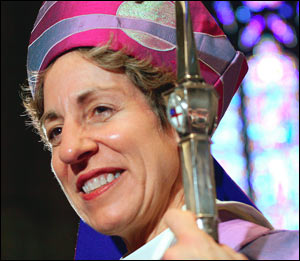It's
been a busy few years since the Most Rev. Katharine Jefferts Schori was
named presiding bishop of the Episcopal Church in 2006.
Since then,
she's traveled to parishes around the world, sharing in the church's
successes and seeking to mend the rifts that stem, in part, from the
ordination of a gay bishop in 2003.
She was in Southeast Texas last
weekend and spoke with reporter Jeannie Kever.
An edited excerpt of the
conversation follows.
Q:
You're here, in part, to bless a home in Galveston that the church
helped to repair after Hurricane Ike. What role does social outreach and
activism play in the Episcopal Church?
A: We understand caring for our neighbor to be fundamentally who we are as Christians. Loving God and loving your neighbor as yourself. Taking care of people in distress is a significant part of that.
Q:
You were an oceanographer before becoming an Episcopal priest. Does
your background as a scientist influence how you approach your role as
bishop?
A: I think I'm
trained and formed in such a way that I look at the world carefully. I
come with a hypothesis, but I'm certainly willing to change it. I just
came back from visiting the church in Mexico. I go to something like
that ready to learn, to see what they're doing, what the challenges are,
and then to ask, where's the intersection with our context, not just in
the United States,
but in the 15 countries we are in? How does this connect with the
experience of Latino Christians here in the United States, which is a
growing part of our context.
Q: What's behind the growth of Latinos in the Episcopal Church?
A: The popular
caricature of the Episcopal Church is white people, maybe rich white
people, in the Northeast. That isn't true, if it ever was. The church
started there, as a planting of the Church of England
during Colonial days, but it has spread west and south and into
immigrant groups. The Spanish-speaking part of the church is one of the
fastest-growing parts. In addition, the overseas part is growing. The
Diocese of Haiti is our largest. The church in Honduras and the church
in the Dominican Republican
are both growing. We serve people of Hispanic heritage very well
because our liturgical framework is familiar, and we seem to be
attractive to them because we don't provide ready-made answers to the
questions people ask. We encourage people to wrestle with those
questions, to come to their own faithful decisions, rather than doing
what the church tells them.
Q:
Obviously, a major issue has been the schism over the ordination of gay
and lesbian priests and bishops. Can you keep the church together if
some people don't, in your view, respect what you see as full human
rights?
A: The church
has struggled with inclusion from the very beginning. The first
Christian fight was whether gentiles could be followers of Jesus. The
history of the Episcopal church has been confronting a series of
questions about who can be a full member of the church, beginning with
African-American slaves. Could you teach slaves about the faith?
Eventually, most places they decided yes. ... Could the church ordain
women? That took longer. At the moment, we're still wrestling with full
membership for gays and lesbians. The church isn't finished with that
discussion.
Q:
How does that play in more conservative parts of the world? Do you
follow one set of beliefs here, and other cultural values in other parts
of the world?
A: That's
really the name of the game with Anglicans. One of our primary issues
during the Reformation was that worship had to be in a language the
people could understand. We take context really seriously, because we
take incarnation, the presence of God in the flesh, very seriously. He
appears to us in different ways in places. I'll give you a contrasting
example. In the 1980s, the Anglican community started to wrestle with
the issue of polygamy in Africa.
Polygamy is not an issue here, except in very small pockets of Utah and
Arizona, and the church has taken a very different position. We said
no. In Africa, the church doesn't officially recognize polygamy. They
certainly have polygamous members of their churches. In some places,
they say the man can't take additional wives once he becomes a
Christian, but he isn't forced to divorce the wives he already has. The
children generally are recognized as full members if they want to be
baptized.
SIC: CHTN/USA

